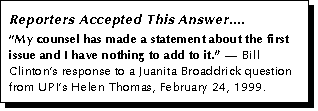 |
|||||||||
|
 |
||
|
 |
||||||||||||||||||||||||
|
||||||||||||||||||||||||
 |
||||||
|
||||||
 |
||||||
|
 |
||||||||||||||||||
|
||||||||||||||||||
 |
||||||||||||||||||||||||
|
||||||||||||||||||||||||
 |
||||||||||||||||||
|
||||||||||||||||||
|
|
|
For Immediate Release: Andrew Langer (703) 683-5004 - Friday, August 13, 1999

Reporters Look Biased in Pressing Bush, But Not Forcing Clinton's Answer About Cocaine or Broaddrick Coke-Question Pushers Ought to Ask Bill On March 27, 1992 Washington Post media reporter Howard Kurtz complained that Bill Clinton was being treated unfairly: "At no time during his presidency has George Bush been subjected to a comparable barrage of scandal-type stories, the kind that can alter forever how the public views a politician."
If the media will press Bush to answer the cocaine question, as they've asked other candidates -- and asking a potential chief law enforcement officer of the United States if he's broken a serious drug law is a legitimate question -- then shouldn't they ask Bill Clinton? Without any actual allegations, the coke question came up on several Sunday talk shows, on ABC's This Week, Fox News Sunday, CNN's Late Edition, Reliable Sources, and Capital Gang. When George Stephanopoulos brought it up on ABC, he said: "I'm not sure Bush is handling this issue well. He's basically making a bet that he can go on without answering it. Everyone who works in the White House has to answer this question." Cokie Roberts added: "Except the President." In Bush's case, reporters have found no one alleging that they have knowledge of Bush using cocaine. In Clinton's case, several Arkansans -- whether credible or not -- have accused Clinton of cocaine use, as detailed in books like Roger Morris's Partners in Power. If some liberal journalist finds an alleger against Bush (as some media partisans in 1988 found "Speedway Bomber" Brett Kimberlin to allege marijuana purchases by Dan Quayle), will national reporters investigate just Bush? And if reporters feel any potential President ought to be pressed to answer if they've broken a law, shouldn't they keep pressing the current President for an answer to Juanita Broaddrick's charge of sexual assault? In July, Washington Post reporters Lois Romano and George Lardner asked: "We need to ask the cocaine question. We think you believe that a politician should not let stories fester. So why won't you just deny that you've used cocaine?" On July 27, Romano went on ABC's Good Morning America to dismiss Bush's non-answer: "He's basically declared that his life began at 40 and that we're supposed to not ask that other fellow before 40 and I don't know if he can hold to that position." Romano interviewed Juanita Broaddrick, and she never showed up on TV to address how another "fellow before 40" got away with nothing better than a lawyer's denial. Despite his assertion to USA Today in 1992 that "no candidate in history" has had a press as tough as he faced, Clinton faced no coke queries in 1992 or 1996. In the April 6, 1992 Newsweek, Jonathan Alter kvetched: "The voters are left confused. All they know is that Clinton is in trouble again, and that red-meat phrases like 'S&L' and 'cocaine dealer' are making their way down the food chain, passing through the New York tabloids en route to Jay Leno's monologue and the files of GOP hit men." But Newsweek hopped on Bush early, in the November 16, 1998 issue: "If you're asked specifically about marijuana or cocaine [use in your past], what's the answer?" Reporters will look biased if they press Bush to break the silence, but not Bill Clinton. Whatever their standard, it shouldn't be a double standard. -- Tim Graham
Home | News Division
| Bozell Columns | CyberAlerts |







 But in Wednesday's Post, Kurtz's story was headlined "Drug
Use: A Campaign Issue in the Making." Kurtz did not complain that asking George W.
Bush about cocaine use is unprecedented and something Clinton has never had to answer
during his presidency. He ended by quoting National Review editor Rich Lowry, who
thinks Bush the Sequel will have to provide an answer.
But in Wednesday's Post, Kurtz's story was headlined "Drug
Use: A Campaign Issue in the Making." Kurtz did not complain that asking George W.
Bush about cocaine use is unprecedented and something Clinton has never had to answer
during his presidency. He ended by quoting National Review editor Rich Lowry, who
thinks Bush the Sequel will have to provide an answer. 